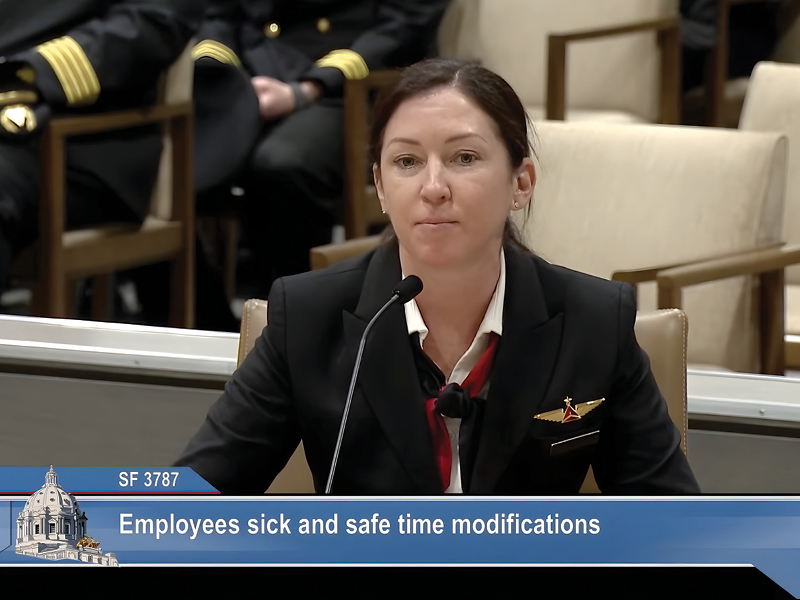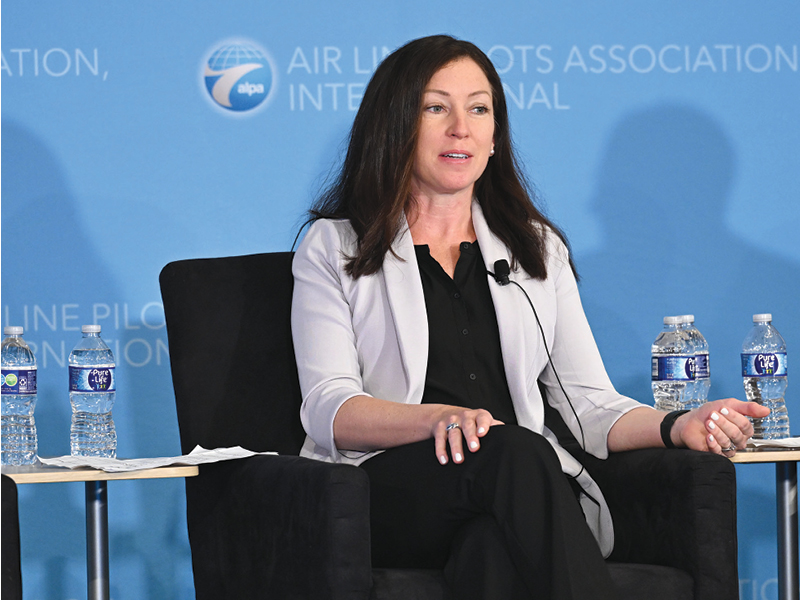Delta Pilot Helps Overturn State Benefits Exclusion
By John Perkinson, Senior Staff Writer

F/O Laura Haynor (Delta) testifies before the Minnesota House Labor Committee on earned sick and safe time benefits for flight crews.
F/O Laura Haynor (Delta) appeared before the Minnesota Legislature on March 5, urging state senators to right a wrong that had been committed the previous year. In 2023, Minnesota passed the Omnibus Jobs Act, which included provisions for earned sick and safe time (ESST) benefits. ESST, which went into effect in January, guarantees Minnesota workers much-needed time off for illness, sick family members, and other outlined family needs. Haynor noted that the bill unfairly excluded airline pilots and flight attendants.
In August 2023, the Delta Master Executive Council (MEC) convened for a meeting in Seattle, Wash., several months after the ESST language had been signed into law. The MEC unanimously passed a resolution calling for the pilot group to actively engage with other aviation labor partners and to seek assistance from ALPA’s Government Affairs Department to address the exclusion and correct this egregious error.
On February 22, Capt. David Forbes (Delta), the pilots’ local executive council chair in Minneapolis, testified before Minnesota’s House Labor Committee in support of an amendment introduced to allow flight crews to avail themselves of the state’s ESST benefits. Forbes then tapped Haynor to provide testimony at a subsequent Senate Labor Committee hearing on March 5.
“I began by introducing myself as an ALPA representative and explaining why I was in favor of the amendment,” said Haynor, who sat in the Minnesota state capital in St. Paul with nearly 20 other pilots watching from the gallery. “We’d been left out of last year’s bill, and I talked about why this was a mistake. I discussed the importance of being able to take care of sick family members, which is something our current sick-leave policy doesn’t cover. Since this is something afforded to Minnesotan workers, Minnesota flight crews should also be able to take advantage of this benefit.”
Several airlines and their trade association have intervened in recent state legislative efforts to expand worker rights, lobbying state governments that the Airline Deregulation Act of 1978 should prevent them from applying this kind of employment-related benefits legislation to flight crews. ALPA has repeatedly argued that an exclusion wasn’t the intent of the law and that pilots and flight attendants should be treated the same as other employee groups, a position the courts have upheld.
Haynor’s testimony received some unexpected national attention when a Minnesota lawmaker confused her for a flight attendant. Following Haynor’s introductory statement, the individual asked her about her typical week as a stewardess. “I’m a first officer for Delta,” Haynor replied, to which the state senator apologized.
Her fight for equal treatment ultimately paid off. Over the Memorial Day weekend, Minnesota Gov. Tim Walz signed H.F. 5247 into law, which included ALPA’s supported amendment allowing flight crews to make use of ESST benefits.
Haynor first began to take an interest in government policy making after flying a trip with Capt. Eric Hall (Delta), the pilot group’s MEC Government Affairs Committee chair. Hall invited her to attend a committee event during which she witnessed the influence of policy making on airline operations and the key role pilots can play in sharing their firsthand knowledge and experience with elected government leaders. Haynor joined the committee, also becoming a district advocate and visiting her federal lawmakers in their home offices to communicate ALPA priorities.

Haynor participates in a panel discussion at ALPA’s recent Legislative Summit.
The Delta Government Affairs Committee recently appointed Haynor to serve as its state labor representative for Minnesota, where she’s the primary contact for the Minnesota AFL-CIO. In addition, the B-737 pilot, who’s scheduled to upgrade to captain in August, participated in a panel discussion titled “District Advocates’ Role in the States,” at ALPA’s recent Legislative Summit in Washington, D.C. While there, she joined other ALPA pilots from Minnesota on Capitol Hill to thank their members of Congress for supporting the recent FAA reauthorization bill and to advise them about the need to block efforts to implement reduced-crew operations.
In addition to the more than 2,000 ALPA members who live in Minnesota, this latest state law helps thousands of other flightcrew members who call the “Land of 10,000 Lakes” their home. All these individuals owe Haynor and her fellow ALPA pilot volunteers a debt of gratitude for getting involved and convincing Minnesota lawmakers to enact this important correction.

